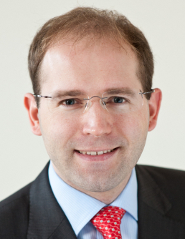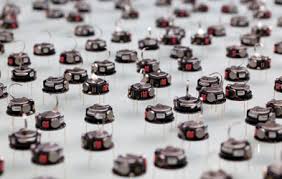 Dr Roderick Gross is a senior lecturer in robotics at the University of Sheffield. His Department is researching the use of small, moving robots. It has the second largest “swarm” of robots in the world.
Dr Roderick Gross is a senior lecturer in robotics at the University of Sheffield. His Department is researching the use of small, moving robots. It has the second largest “swarm” of robots in the world.
There is great interest in the behaviour of swarms of creatures that individually have limited intelligence. When you consider the quite complex and large structures produced by termites or how fish increase their protection from predators by travelling in shoals, you have results that are greater than the sum of the individual parts. The interest in swarms is that only small “brains” are involved. Our traditional image of a moving robot is something with arms and a head that might be found in Star Wars. Such machines have large computers that are expensive to build and to run. Roderick is interested in simple machines with small limited computing power that tend to be light weight and use little energy. Machines that use solar energy or small batteries can move around unrestricted.
One area of research is the use of robots that undertake set tasks without the need to constantly be controlled from a super computer. An example of an application may be in agriculture where a large number of small robots would go up and down rows of plants administering water and feed just to the individual plants as required. This might be more efficient in the use of water and feed and would not compact the land the way that current farm machinery does.
There is now talk of delivering merchandise bought on the web by drones. Such drones would have to avoid crashing into things and other drones and possibly help each other to carry heavier items. We are into the area of swarm robotics. As robots can operate in areas that may be dangerous for humans, search and rescue may be another area.
Roderick Gross fully grabbed the interest of his audience as it became apparent that a new age may be just around the corner and it is being developed now in laboratories just down the road from the meeting venue.
